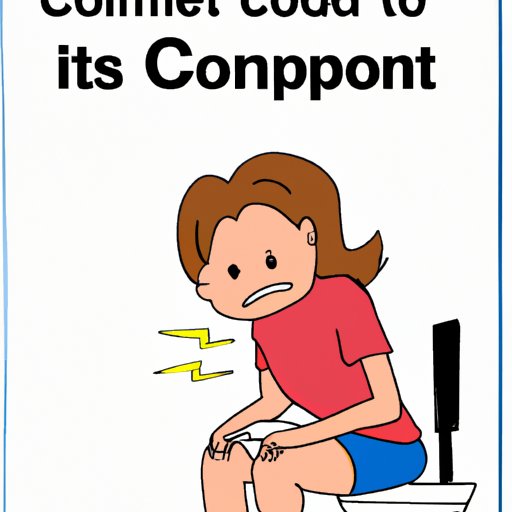Introduction
Constipation is a common digestive disorder characterized by infrequent bowel movements, difficulty passing stools, or a feeling of incomplete evacuation after a bowel movement. It can cause pain, bloating, cramping and other uncomfortable symptoms. If left untreated, constipation can lead to serious health complications, such as hemorrhoids, rectal prolapse, and fecal impaction. Therefore, it is important to take action to resolve the issue.
Drink Plenty of Water
One of the best things you can do for constipation is to increase your water intake. Water helps to soften stool and encourages regular bowel movements. According to the Institute of Medicine, men should drink about 13 cups (3 liters) of fluids per day and women should drink about 9 cups (2.2 liters). It is also important to avoid caffeinated beverages, which can act as diuretics and dehydrate the body.
Eat High-Fiber Foods
A high-fiber diet is essential for relieving constipation. Fiber helps to add bulk to the stool and makes it easier to pass. Good sources of fiber include fruits, vegetables, legumes, whole grains, nuts, and seeds. It is important to increase fiber intake gradually to avoid bloating, gas, and abdominal discomfort. It is also important to drink plenty of water when increasing fiber intake to ensure that the fiber is properly absorbed by the body.
Exercise Regularly
Regular physical activity is key to preventing and relieving constipation. Exercise helps to stimulate the digestive system, which can help to move food through the intestines more quickly. Walking, jogging, swimming, cycling, and yoga are all good choices for relieving constipation. Aim for at least 30 minutes of moderate-intensity exercise per day.
Take Over-the-Counter Laxatives
If lifestyle changes are not enough to relieve constipation, over-the-counter laxatives may help. Laxatives work by increasing fluid in the intestine, softening the stool, and stimulating the muscles of the colon. Common types of laxatives include fiber supplements, osmotic laxatives, stimulant laxatives, and stool softeners. It is important to use laxatives as directed and only as needed, as overuse can lead to dehydration and electrolyte imbalances.
Add Probiotics to Your Diet
Probiotics are beneficial bacteria that are found naturally in the digestive system. They help to maintain healthy gut flora, which can improve digestion and relieve constipation. Foods that contain probiotics include yogurt, kefir, kombucha, sauerkraut, and miso. Supplements are also available, but it is important to speak to a doctor before taking any kind of supplement.
Try Herbal Remedies
Certain herbs have been used for centuries to relieve constipation. Some of the most common herbs used for this purpose include senna, aloe vera, psyllium husk, dandelion root, and cascara sagrada. It is important to use these herbs safely and as directed. Speak to a healthcare provider before using any kind of herbal remedy.
Consult With a Doctor
If lifestyle changes and over-the-counter treatments are not enough to relieve constipation, it is important to speak to a doctor. A doctor may suggest additional treatments, such as prescription medications, enemas, or suppositories. In some cases, surgery may be recommended if the constipation is caused by a structural abnormality in the intestines.
Conclusion
Constipation can be a painful and uncomfortable condition. Fortunately, there are several steps you can take to relieve the symptoms. Drinking plenty of water, eating high-fiber foods, exercising regularly, taking over-the-counter laxatives, adding probiotics to your diet, trying herbal remedies, and consulting with a doctor are all effective ways to manage constipation. By following these tips, you should be able to find relief from your constipation symptoms.
(Note: Is this article not meeting your expectations? Do you have knowledge or insights to share? Unlock new opportunities and expand your reach by joining our authors team. Click Registration to join us and share your expertise with our readers.)
